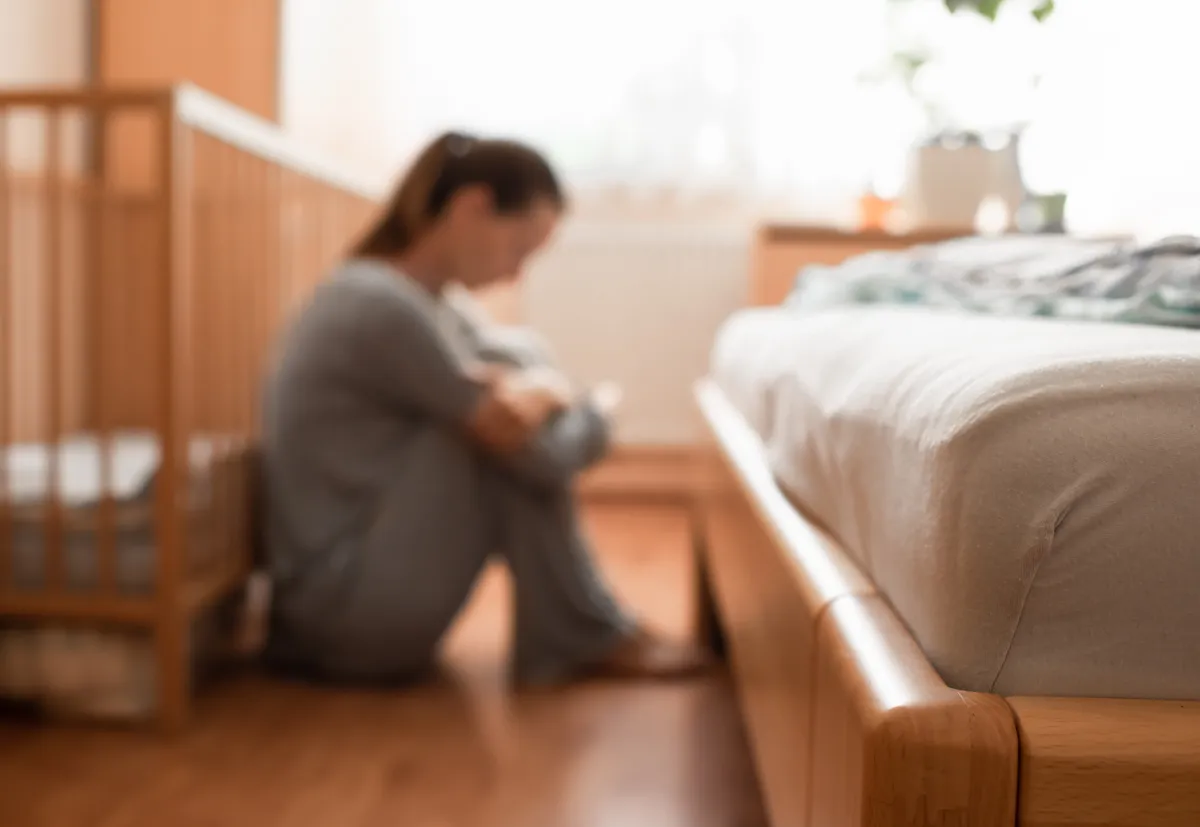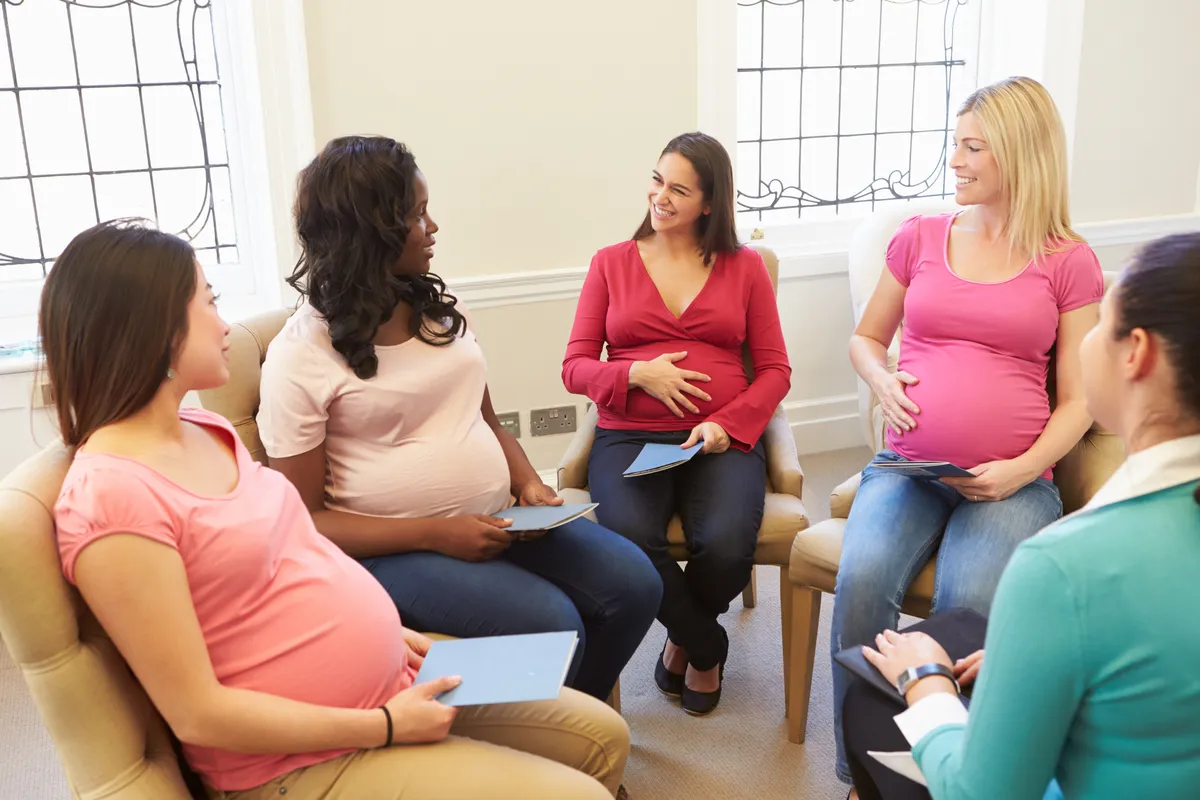👋 Happy 2024! We have an exciting year ahead, including the launch of a First 1,000 Days Policy Coalition to advance 2-generation, family-friendly policies to help build the foundation for lifelong well-being. Future issues of Starting Early – which moves to a monthly publication schedule this year — will provide updates and information as we progress.
Healthy families hinge on healthy mothers. Unfortunately, though, the United States has the highest maternal mortality rates in the developed world. That’s devastating for families. Complications from mental health issues, including suicide and overdose, are the most common cause of maternal death in the first year after birth.
That’s why I was so impressed that maternal mental health was the focus of November’s Black Maternal Health Summit, an annual convening led by New Jersey First Lady Tammy Murphy. The mothers and community leaders participating brought home how difficult it can be for new mothers to get support and treatment for mental health issues. Identifying mental health concerns and helping families connect to services can be lifesaving for new moms.
In this issue of Starting Early, we delve into maternal mental health and speak with Ria Rodney, the first director of Nurture NJ, the state office dedicated to coordinating an all-hands-on-deck action plan to improve maternal and infant health.
Atiya Weiss
Executive Director, the Burke Foundation
1 big thing: When it’s not just the “baby blues”

Mothers in the first year after giving birth often endure loneliness, sleep deprivation, and a sense of helplessness in the face of babies’ overwhelming needs. For 1 in 5 new mothers, this period can cross into clinical mental health issues, including depression, anxiety, obsessive-compulsive disorder, and substance use disorder. These are the most common complications of pregnancy and birth, yet for most moms these conditions go untreated.
- Maternal mental health conditions affect 800,000 US families a year.
- 27% of women who experience anxiety or depression postpartum entered pregnancy with one or both conditions.
- 75% of those with maternal mental health issues are untreated.
- The nationwide cost of not treating maternal mental health conditions is $32,000 per mother/infant pair, or $14 billion a year.
Why it matters: Better maternal mental health care would significantly improve the overall health of mothers and the families that rely on them.
Dig Deeper: The consequences of untreated mental health conditions are broad – affecting mothers, children (new babies and other children in the family), fathers, partners, and caregivers. The cascading effects can last for generations.
- Many women facing mental health issues during and after pregnancy don’t get timely, responsive care.
What’s needed for families: In addition to having more mental health professionals available for families, responsive state and federal policies can relieve stress and worry for parents.
- Supportive systems: Joy Burkhard, executive director of the Policy Center for Maternal Mental Health, summed up the types of policies that can make a difference for families in a follow-up to a segment on CBS Sunday Morning. She calls for such improvements as “affordable and available infant and child care, paid family leave to heal from birth and care for their babies, child tax credits, and postpartum doulas and night nurses to support sleep, feeding, and more.” She also advocates for parenting classes and postpartum support groups promoted by and covered by insurance.
- Include dads: The mental health care model for new families should include all caregivers, especially fathers. While dads are often the first line of support for moms, they also can struggle with postpartum mental health. One in 10 dads gets postpartum depression, and up to 18% develop a clinically-significant anxiety disorder at some point during the pregnancy or the first year postpartum. Extending paid leave to fathers can go a long way toward supporting the entire family’s well-being.
- Community connection: It’s also critical to build maternal healthcare systems that include and reflect the people they serve. The Maternal Mental Health Equity Fund recently issued a Request for Proposals for organizations and leaders from within communities that deliver models of care built in and by Black, Indigenous, People of Color (BIPOC) communities.
2. What’s working for families

No state has it completely right, but here are some approaches that make a difference.
- Mental health screening for all new moms: New Jersey requires all perinatal health care providers (OB-GYNs, midwives, APNs, family practice) to screen all mothers for mental health issues, an important step that can start a conversation about potential issues and treatment.
- Intervening early: New Jersey’s new Universal Home Visiting initiative offers new moms an in-person or virtual nurse visit in the first 3 weeks after birth. The nurses are trained to assess mental health and to identify and address sources of stress for families, including housing, nutrition issues, and problems finding or affording child care.
- Community-centered care: Community doulas often have months to build a trusting relationship with moms-to-be. They provide culturally-sensitive guidance to families during and after pregnancy, including identifying mental health challenges early, connecting families to resources, and helping destigmatize mental health care — all of which can speed up treatment.
- Integrated care: Most families visit a pediatrician regularly. HealthySteps adds a child development expert — such as a licensed clinical social worker — to the primary care team to help families with common sources of stress, including sleep, discipline, bonding, and mental health challenges. All children up to age 3 and their caregivers receive a set of screenings along with education and follow-up support as needed.
- Group support: CenteringPregnancy, and CenteringParenting bring small groups of expectant mothers and new families together for their routine prenatal and pediatric primary care. This helps build a community of support and trust with peers and providers who share advice and guidance.
- Extended coverage: New Jersey’s expansion and extension of Medicaid provides new mothers with insurance coverage for the full year after birth, giving them time to receive care for mental health issues.
On the front lines of maternal mental wellness with Ria Rodney

Ria Rodney joined Nurture NJ last year as the inaugural director. A nurse, doula, social worker, and advocate for improving health disparities, Ria plays a major role in the launch of New Jersey’s statewide universal home visiting program.
Below is a condensed version of our conversation with Ria on improving mental health care for new and expectant mothers. You can read the full interview here.
What do you wish people understood better?
I wish more people knew that many women experience postpartum depression and mood changes both with pregnancy and with having a newborn.
I also don’t think the information is getting out there that the risk window for feeling postpartum mental health symptoms is a year after a baby’s birth.
Many people don’t realize that dads can also experience depression, but the estimate is that 1 in 4 dads have some type of postpartum depression or mood disorder.
What’s new or trending in the area of maternal mental health?
More people are sharing their stories through social media. There’s a universal quality to it, with people of different ethnic, socioeconomic, and religious backgrounds all talking about their experiences. Say you have somebody writing a post about being sleep-deprived or having trouble making friends with other parents. They’ll wake up the next day and see 1,000 comments supporting them. I’m always thankful for people who share their stories because it helps us normalize these conversations.
What are major barriers to care?
One barrier is accessing care. Different people need different types of support, and it can be overwhelming for a person to navigate what support might look like for them.
Stigma also plays a role in preventing people from seeking mental health services. There is this need to fit the picture of perfect parenting, always bonding with your infant and having a wonderful experience. There is also a concern over, “What will people think or what response might I get if I say I’m having a difficult time?” Culture impacts how people get services, so people might say, “Oh, in my culture, we wouldn’t see a therapist.”
My hope is that through Nurture NJ we will provide more education on the services available through our state, so we can break down silos and get families what they need in a timely manner.
What are some promising solutions?
Universal home visiting will be a game changer for New Jersey families. The [home visit] nurses have had extensive training, including on cultural competency and how to screen for mental health issues. They’re also able to refer families to mental health-related services.
Another exciting innovation is that in New Jersey we are scaling up our perinatal workforce, meaning we’ll have more doulas, community health workers, and perinatal clinical therapists.
3. Tools you can use

Faced with mental health issues, it can be a struggle to find the help you need. Here are a few valuable tools to help.
Do I have postpartum depression? The Edinburgh perinatal depression scale is commonly used to assess postpartum mental health issues.
How can I find help? Call or text the National Maternal Mental Health Hotline at 1-833-TLC-MAMA (1-833-852-6262). It provides free, confidential, 24/7 mental health support for moms and their families before, during, and after pregnancy. English- and Spanish-speaking counselors are available and interpreter services are available in 60 languages.
If you’re in mental health distress or have a suicidal crisis, call or text the
Suicide and Crisis Lifeline at 988 for free, confidential support.
Postpartum Support: Postpartum Support International has many resources for birthing families, including online support groups and a network of perinatal mental health providers.
Where can I learn more? The US Department of Health and Human Services Office on Women’s Health offers resources for people who may be dealing with postpartum depression and other concerns. They also operate 1-833-TLC-MAMA (1-833-852-6262) for 24/7 free, confidential support for pregnant and new moms.
Better care for Black mothers: She Matters is an online community for Black women experiencing postpartum depression. Its Cultural Competence Certification Program helps improve the health of Black women with postpartum complications.
What can I do to feel better? Consciously taking time for self-care is essential to physical and mental well-being. This action-plan worksheet from the American Academy of Family Physicians provides a helpful framework.
What about dads? Often the most important support for moms struggling with perinatal mental health, dads can face struggles of their own. Here’s a one-stop shop for resources, chat groups and guides for new fathers.
The roundup
- Lifting up maternal health:January 23 is Maternal Health Awareness Day. Learn more about what you can do to advocate for maternal health and register for a live webinar on health care access in crisis.
- Supporting moms: Nurture NJ is promoting several events around Maternal Health Awareness Day. See the full calendar of events happening through January 31.
- Building community resources: Join a January 24 virtual session hosted by New Jersey Health Care Quality Institute. The session will focus on improving community-based social supports for families.
- Serving NJ families: Family Connects NJ is live! The State of New Jersey’s official postpartum nurse home visitation program is now accepting appointments for Essex, Middlesex, Mercer, Gloucester, and Cumberland County families.
- Examining maternal mental health: The 2024 Maternal Mental Health Forum will be held virtually March 19-20. The forum will dive into Black and Latina maternal mental health along with updates on federal policy and research, philanthropic approaches, and more.
- Working together: The National Perinatal Association holds its annual interdisciplinary conference May 15-17 in Anaheim, CA. This year’s focus is trauma-responsive perinatal care
